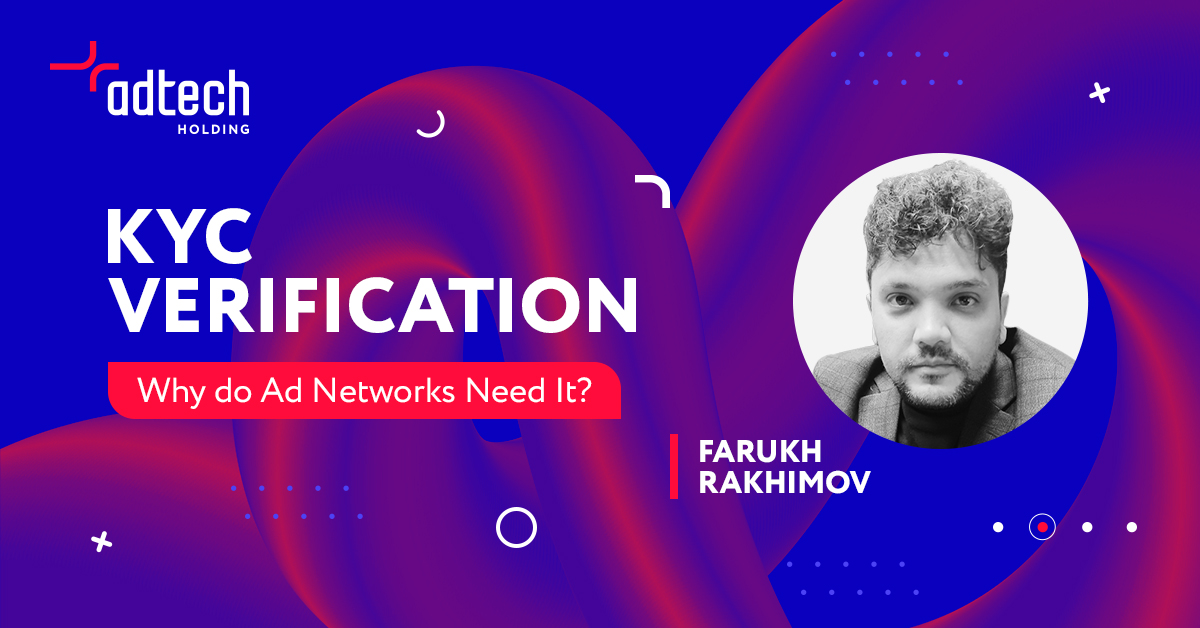KYC Procedure: Why Is This a Sign of a Trustworthy Ad Network?

The Know Your Customer (KYC) procedure is aimed at confirming the identity of individual clients and business partners of a company. In simple words, KYC is a process of verifying a customer’s identity, financial status, and overall activity, as also evaluating the risk involved — and it has been standard practice in financial institutions like banks for quite a long time so far.
The KYC procedures are undertaken and applied by multiple organizations in various industries and jurisdictions worldwide, ad networks included. The KYC practice is today broadly considered a standard procedure and a security tool for both companies and their financial institutions. It offers awareness, safety, trust, and stability, and it broadens the activities and financial horizons of a company, its clients, and the market in general.
Overall, the very precise definition is as follows: KYC is the acronym for Know Your Customer and refers to a set of processes that both financial institutions and companies carry out to verify the identity of their customers, as well as to determine the level of risk and trust that the cooperation with a certain client would set.
The KYC procedure implies that a customer needs to provide a company with personal details that confirm their identity and financial activity. Why is it so important? Does it protect clients’ data, and is it really wise not to comply with it?
We asked Farukh Rakhimov, Head of Compliance, Data Protection, and Information Security at AdTech Holding.
Farukh Rakhimov: What is KYC, and Why Do Ad Networks Need It?
— Basically, KYC is related to internal identification and financial and risk assessment procedures: a company needs to confirm that a customer is indeed the person who shows to be and that this person is not involved in any illegal financial activity. Why is it required at ad networks, too?
Farukh: Firstly, ad networks are also involved in a number of interactions with their customers, including financial ones. Advertisers send their funds to top up their ad campaigns, while publishers accept payments to receive their monetization earnings. Thus, a KYC procedure at an ad network allows a company to identify a customer and make sure they are not a part of any financial fraud scheme.
However, the most important question is creating and maintaining a safe and risk-free financial environment around the company. For example, an ad network wants to work with reliable and trustworthy payment gateways like PayPal. PayPal will definitely need to check if the wannabe partner and its clients are safe to cooperate with.
In other words, if an ad network allows full anonymity for customers, it risks being suspended from processing with its financial institutions — and this risk might spread to the rest of its partners and clients. Obviously, no reputable contractor or customer would agree to work with a company that might become a threat to the overall business process.
Therefore it is very important for a company to create solid foundations to be maintained and provide the safest possible environment for its business and business relationships with its clients and partners to grow.
Overall, KYC is a standard legit procedure that helps manage financial, legal, and reputational risks for companies and their partners and to build trust between a business and its customers.
— However, it seems like KYC was not a procedure followed by ad networks some time ago. Is KYC really a newly developing trend?
Farukh: In modern AdTech businesses, it is much safer, easier, and more prosperous to work transparently. Privacy, security, and transparency are becoming big concerns in the digital space, and it is mainly related to new standards and regulations that are becoming tougher worldwide. Keeping customers anonymous is now not a unique selling point — but, on the contrary, a sign that a company might lack independent regulation and partnerships with trusted financial institutions and ensure a wide variety of payment solutions for its customers.
So, while KYC is not obligatory for most businesses (with some exceptions), ad companies tend to implement it as a part of their normal workflow.
However, I wouldn’t name it a new tendency. For example, AdTech Holding projects have been using KYC practices for at least the last six years. What might be called a trend is making the whole procedure quicker and more convenient. As KYC has already become a standard for us, it must be integrated into the whole process as smoothly as possible.
— Thus, a company requesting a customer to go through the KYC procedure is a kind of proof that it is a trustworthy business, right?
Farukh: Exactly. How can a company provide a client with transparent conditions and enhance its experience by contracting with reliable payment methods or software providers if it doesn’t know who this client is?
Overall, this is an endless circle: trustworthy companies that ensure normal workflows cooperate exclusively with businesses that know their customers, and clients want to join a stable, secure ecosystem consisting of such trustworthy companies.
In fact, a secure identity verification check increases trust in a business. 80% of users trust businesses overall when they use checks as part of this process. And this trust doesn’t just apply to business-customer relationships but to peer-to-peer environments as well.
— You say that KYC is an international standard procedure for trustworthy businesses. So which are some of the common KYC triggers?
Farukh: Basically, an ad network has several triggers to initiate KYC for a particular client:
- A client wants to make his first bank payment or withdrawal;
- A client wishes to change their payment method, and the network needs to make sure they are the appropriate beneficiary of their payment method account;
- A client changes their location, and the business needs to confirm it or make sure they have the right to run campaigns and accept payments from this country;
- A client has more than a single account. Multi-accounting can lead to various term violations — like overusing discount coupons and others. However, sometimes, customers need to create additional accounts for their employees or for working from another country — and this is a matter of a KYC check.
— You mentioned the importance of transparency between an ad network and its contractors. Are there any measures to ensure transparency for customers, too?
Farukh: Yes, sure. As I have already mentioned, modern ad businesses are striving to make the KYC procedure as easy and transparent as possible and are constantly working to improve the workflow. Here is what AdTech industry businesses usually implement:
- Reducing the number of required documents. Many networks request their partners to share their ID and payment methods confirmation — and exclude utility bills from the list of standard documents, asking for them only in particular cases.
- Excluding all third parties from the process of requesting and sharing documents. The KYC procedure might involve a support team, but now it is done automatically. For example, a customer can receive a request at their personal account and upload the requested confirmations. These files appear on a special secure server, and only compliance officers have access to this server.
— As we touched upon security, let’s also speak about some measures ad networks take to ensure safe data storage. How are documents stored and checked? Overall, how can a customer confirm an ad network won’t abuse their rights in regard to personal data?
Farukh: There are several points that can prove an ad network (or any other organization) conducts the KYC in a responsible, honest manner. Here is what networks usually do to ensure customers’ data will not be compromised:
- All user data they send to a network within KYC is kept on separate secured servers that use the latest protection technologies.
- All the information requests have a particular purpose, without the right to use any data for any other aim. This is one of the principles of the European General Data Protection Regulation.
- Voluntary certification, for example, the ISO 27001 certificate. It means a company works under the control of an independent audit company that checks if the KYC workflow and data storage complies with world-recognized standards.
- The company processes requests on a Need To Know basis. It means only particular certified employees can get access to clients’ information. In simple terms, nobody but compliance managers can see clients’ payment or ID data.
- Trusted ad networks don’t share clients’ data with any contractors or other third parties without a purpose. Such cases are only possible when there is a special official request from a governmental structure — police, FBI, anti-money laundering authorities, etc.
— And what do ad networks do with clients’ data within the KYC process? What happens to the data after all the checking is over?
Farukh: The applied standards of KYC suggest automating the process and making it as quick and safe as possible. To do so, ad networks use large third-party databases alongside in-house systems to compare clients’ information with their documents and make sure a certain client is not involved in anything illegal.
What is important here, the databases used for KYC do not grant access to anyone. They also have their KYC policy and work exclusively with large companies after a special onboarding.
Speaking about data storage, the world-class guidelines suggest keeping it for a limited period as per the retention timeframe. After this period is over, the data is securely disposed of. The essential proof that a company complies with these data storage standards is the ISO certificate we mentioned above. And we try to follow, apply and improve the best practices in our business processes.
— Do you think the KYC procedure can become even more permanent, transparent, and quick in the future?
Farukh: There’s a little chance companies will refuse KYC someday as it is not a feature but already a standard for building trust between a business and a customer. It is a voluntary part of the workflow, but companies do implement it as it ensures stable and safe operation.
So, KYC is here to stay, and most AdTech and MarTech businesses are constantly working on workflow improvement. They understand that despite being interested in working with a legal and safe organization, clients still want to provide them with as little information as possible. And, of course, they need to be 100% sure their data doesn’t go anywhere else.
For example, to upgrade the process and make it convenient for both compliance management and customers, AdTech Holding’s projects plan to integrate new software able to make all necessary checks in a couple of seconds. In this way, it will be possible to confirm clients much quicker and narrow the set of people involved, which means an even higher security level.
Overall, it is essential to follow four principles of KYC: Automation, Confidentiality, Transparency, and Security. To speed up the overall process, AdTech Holding’s projects are to make KYC a simple and non-intrusive part of their and their customer’s workflows.





